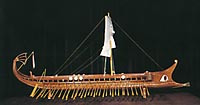

Should a trierarch die during his period of service, his heir normally stood in for him for the remainder of the year. He thus became a member of the trierarchic class, and could continue to belong to it in his own right by taking on other trierarchies. But if the trierarch had left outstanding ship debts behind him at his death, his heirs had to pay them - it made no difference whether they were all possessors of the estate or had shared it between them.
 |
The basic requirement for joining the trierarchic class was to have visible property. However, there were some rentiers who, owing to the large income needed for a trierarchy, had recourse to concealing part of their estates, their objective aim being to dodge the trierarchy. This tactic made it difficult for the Athenian state to pick out well-to-do citizens as candidates to take on 'liturgies'. |
A trierach might display inordinate zeal in building his
vessel and maintaining it. In that case, he got not only his
crown of ivy, but notability and self-respect.
Undertaking trierarchies and carrying them out with success was
both a personal vindication of his abilities and proof of his
economic clout. His polis had need of his estate, and he
placed it selflessly at her disposal.
The trierarchic and more generally the 'liturgic' eisphora was an essential to Athens. In the fourth century it was equal, we know, to over half the total state revenues.
 |
 |
| | introduction | landowning-farming | trade | mines | | |||
| | state welfare | liturgies | private property | | |||
| |||